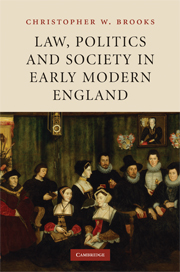Book contents
- Frontmatter
- Contents
- Preface
- Abbreviations and conventions
- 1 English history and the history of English law 1485–1642
- 2 Courts, lawyers and legal thought under the early Tudors
- 3 The initiatives of the crown and the break from Rome
- 4 Political realities and legal discourse in the later sixteenth century
- 5 The politics of jurisdiction I: the liberty of the subject and the ecclesiastical polity 1560 – c. 1610
- 6 The politics of jurisdiction II: multiple kingdoms and questions about royal authority
- 7 The absoluta potestas of a sovereign and the liberty of the subject: law and political controversy in the 1620s
- 8 The degeneration of civil society into a state of war 1629–1642
- 9 Law and ‘community’
- 10 The aristocracy, the gentry and the rule of law
- 11 Economic and tenurial relationships
- 12 The household and its members
- 13 The person, the community and the state
- 14 Conclusion
- Manuscript bibliography
- Index
- References
5 - The politics of jurisdiction I: the liberty of the subject and the ecclesiastical polity 1560 – c. 1610
Published online by Cambridge University Press: 06 July 2010
- Frontmatter
- Contents
- Preface
- Abbreviations and conventions
- 1 English history and the history of English law 1485–1642
- 2 Courts, lawyers and legal thought under the early Tudors
- 3 The initiatives of the crown and the break from Rome
- 4 Political realities and legal discourse in the later sixteenth century
- 5 The politics of jurisdiction I: the liberty of the subject and the ecclesiastical polity 1560 – c. 1610
- 6 The politics of jurisdiction II: multiple kingdoms and questions about royal authority
- 7 The absoluta potestas of a sovereign and the liberty of the subject: law and political controversy in the 1620s
- 8 The degeneration of civil society into a state of war 1629–1642
- 9 Law and ‘community’
- 10 The aristocracy, the gentry and the rule of law
- 11 Economic and tenurial relationships
- 12 The household and its members
- 13 The person, the community and the state
- 14 Conclusion
- Manuscript bibliography
- Index
- References
Summary
The rule of law and personal liberty
In the long history of the relationship between law and society in England, the later sixteenth century must be reckoned one of the most dynamic. Increases in the amount of legal business entering courts at all levels occurred on a scale that had not been seen for at least two hundred years previously. There had never before been a higher ratio of lawyers to population than had emerged by the end of the sixteenth century. It is not surprising that the first fifty years of the life of Sir Edward Coke, a Jacobean judge whose professional writings exerted an influence for at least two centuries after his death, coincided almost exactly with the period from the accession of Edward VI to the death of Elizabeth, or that his law reports reflect so much of the social and economic life of middle England.
Thanks, moreover, to the intellectual structures of the time, as well as confessional conflict and uncertainties about the succession to the throne, political rhetoric and constitutional thought were cast in a mode of discourse that merged technical legal learning with a more general emphasis on the role and benefits of law as a defining characteristic of the state and civil society. Potentially nationalistic, and capable of being given an historical dimension, this was also broadcast surprisingly deeply into the localities, often with the avowed oratorical purpose of persuading people to maintain their loyalty to government but at the same time encouraging them to participate in it.
- Type
- Chapter
- Information
- Law, Politics and Society in Early Modern England , pp. 93 - 123Publisher: Cambridge University PressPrint publication year: 2009

